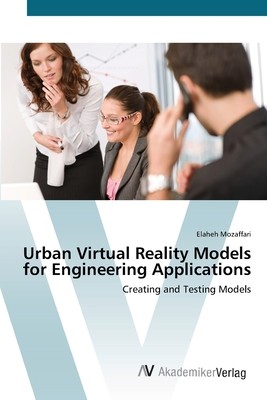
- We will send in 10–14 business days.
- Author: Elaheh Mozaffari
- Publisher: AV Akademikerverlag
- Year: 2012
- Pages: 136
- ISBN-10: 3639415035
- ISBN-13: 9783639415032
- Format: 15.2 x 22.9 x 0.8 cm, minkšti viršeliai
- Language: English
- SAVE -10% with code: EXTRA
Urban Virtual Reality Models for Engineering Applications (e-book) (used book) | bookbook.eu
Reviews
Description
Revision with unchanged content. In order to realize Urban Virtual Environments (UVEs), an enormous amount of time and money must be invested. Although large-scale UVEs can be created using commercial software, these models focus only on the exterior shapes of buildings and do not include all the details necessary in engineering applications. Therefore, a practical and economic data integration method for creating UVEs is needed. In addition, users of these applications may encounter insuperable problems when exploring and navigating the large virtual environments while attempting to accomplish specific tasks. Properly designed interfaces for navigation, however, can make that experience more userfriendly. In this book, a data integration method is introduced that will generate UVEs automatically by integrating Geographic Information System (GIS) maps, Computer Assisted Design (CAD) models, images, and databases of information related to each infrastructure. A framework is proposed for using these models to suit the requirements of mobile infrastructure management systems. In addition, a new taxonomy of navigation methods and support tools suitable for engineering applications in UVEs is addressed. Also, a novel GIS-based approach for usability testing of these methods and tools is proposed in which user behavior is analyzed while they navigate UVEs.
EXTRA 10 % discount with code: EXTRA
The promotion ends in 21d.06:16:24
The discount code is valid when purchasing from 10 €. Discounts do not stack.
- Author: Elaheh Mozaffari
- Publisher: AV Akademikerverlag
- Year: 2012
- Pages: 136
- ISBN-10: 3639415035
- ISBN-13: 9783639415032
- Format: 15.2 x 22.9 x 0.8 cm, minkšti viršeliai
- Language: English English
Revision with unchanged content. In order to realize Urban Virtual Environments (UVEs), an enormous amount of time and money must be invested. Although large-scale UVEs can be created using commercial software, these models focus only on the exterior shapes of buildings and do not include all the details necessary in engineering applications. Therefore, a practical and economic data integration method for creating UVEs is needed. In addition, users of these applications may encounter insuperable problems when exploring and navigating the large virtual environments while attempting to accomplish specific tasks. Properly designed interfaces for navigation, however, can make that experience more userfriendly. In this book, a data integration method is introduced that will generate UVEs automatically by integrating Geographic Information System (GIS) maps, Computer Assisted Design (CAD) models, images, and databases of information related to each infrastructure. A framework is proposed for using these models to suit the requirements of mobile infrastructure management systems. In addition, a new taxonomy of navigation methods and support tools suitable for engineering applications in UVEs is addressed. Also, a novel GIS-based approach for usability testing of these methods and tools is proposed in which user behavior is analyzed while they navigate UVEs.


Reviews